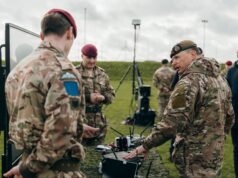In a Defence Committee session on 17 December 2024, senior Ministry of Defence (MOD) officials faced scrutiny over the ongoing recruitment crisis and the performance of contractor Capita.
The discussion, chaired by Tanmanjeet Singh Dhesi MP, highlighted the Army’s inability to meet recruitment targets, with just 63% achieved this year—the worst performance in five years.
Addressing the issue, Dhesi criticised the figures: “It’s a dire situation. Five years ago, recruitment rates were at 95%, but they have now slumped to 63%. This is less than two-thirds of the target and is simply unacceptable.”
David Williams, MOD Permanent Secretary, acknowledged the shortcomings of the Capita contract, which manages Army recruitment. He detailed plans to replace it with a new Armed Forces recruitment programme, stating: “We are well advanced in the replacement project for that contract, the Armed Forces recruitment project, which will operate on a tri-service basis. We expect to place a contract by the spring of next year, and the new programme will have a phased introduction to allow the supplier two years to step up recruitment requirements fully.”
Williams also outlined lessons learned from Capita’s poor performance, highlighting the need for personal engagement by uniformed personnel during recruitment and the importance of reducing bureaucratic delays. “This Government has set out measures, including reviews of medical standards, to reduce the number of applicant rejections and shorten the timeline from application to training,” he said.
Lieutenant General Sir Robert Magowan, Deputy Chief of the Defence Staff for Military Capability, echoed these concerns. “Recruitment and retention are critical for our military capability. We need to recruit more and retain more across all three services,” he said, admitting that the Army’s missed targets were a serious concern. He assured MPs that new measures outlined by Williams would address the issues.
Lincoln Jopp MP queried whether the MOD’s new targets, including faster recruitment timelines, would impact the tendering process for the replacement programme. Williams clarified: “We don’t need to revisit the commercial arrangements. Many of the measures to speed up the pipeline, such as electronic sharing of medical records with candidates’ GPs, are independent of the contract. These measures will ensure we meet the new timelines without renegotiation.”
Derek Twigg MP pressed Williams on what specific improvements the new system would deliver compared to Capita’s performance. Williams explained: “Expressions of interest are high, but the process for medical checks, background verification, and sequencing of tasks is too slow. The new programme will focus on making conditional offers earlier and reducing unnecessary delays.”
Williams acknowledged the historical fluctuations in recruitment success, noting: “Where we had got to five years ago reflected a focused improvement in the operation of the contract. However, progress stalled, particularly during COVID-19, and we’ve not seen a recovery since.”













It’s not called “Crapita” for no reason: dirty work at the crossroads I imagine.
They should be fined for failure of contract failure and investigated.
They were a significant conservative donor. Your assuming there was delivery standards in the contract. The good law project has been trying to bring light to all the terrible contracts the last goverment signed.
It seems as if there were neither incentives to achieve targets nor penalties for under-performance, when this was all set up.
Also, I recall Capita getting a renewal of contract some yers ago even following their poor performance.
Well said Graham, HMG seem to be unable to put in place even the most basic contracts – Or, there is real corruption going on. SO Capita has been paid £500M to destroy forces recruitment? with absolutely no comeback?
Welcome to the campaign the good law project has been trying to draw light on over terrible contracts the last goverment signed.
I suspect there was a very obvious reason the previous goverment kept trying to block the courts seeing the contracts. The fact they did is public record
Not to let capita off the hook because clearly they are shit but perhaps the British Army and its requirements are the problem as much as anything. In this day an age how many jobs require someone to submit medical record history. Who is qualified to even read this stuff, how much time and money is wasted doing it and how many people are rejected needlessly because of some child hood complaint.
If medical examinations are required and I don’t think they are for most jobs in the army then go back to doing them on the spot. Let the individuals volunteering for the army decide if they feel well enough for the job and if they fail in basic training then they can be let go.
Problem is the army is run by infantry officers who look at everything from an infantry officer perspective and have little grasp of the complexities of organisations. These officers giving a list of criteria to a private company like capita was always going to be a disaster. The same people who came up with 2000 separate specifications for an armoured vehicle.
Everyone in the Army is expected to be able to work as an Infanteer if the situation arises, so…. pretty much most jobs in the Army require a medical.
Failure in Basic Training is not desirable, by the time you’ve completed enough of basic to be in a position to fail the government will have already sunk thousands of pounds into you. If you can identify someone who won’t pass before they waste 13 weeks of accommodation, feeding, training, pay, equipment etc (and yes they’ll probably take up 13 weeks since they’d be backsquadded and given remedial training before being thrown out completely).
Surely it should be a basic tenet that those tasked and expected to defend as a member of the UK armed forces have the fitness to do so & the fact recuitment is at a low has nothing to do with a medical but everything to so with the process itself.
Ensuring someone is fit to do their job as member of the UK forces is not the same as writing a wish list for a recce vehicle or Tank & I would wager even those generals have more experience than the ubiquitous Armchair variety.
After decades working with DE&S, don’t think civilians within MOD have any background knowledge beyond gossip.
After spending two years faffing with DE&S and DSG over dodgy spares I can assure you officers believe what their underlings tell them…as long as it doesn’t rock the boat
They were no better recruiting for the Civil Service., 18 months the norm from application to start date. The company and all its shady offspring should be blacklisted by HMG
To be fair, the process for joining the civil service has been excessively long, way before it was outsourced. Just old school thinking vs the much more streamlined processes for private sector company recruitment.
I had first hand experience of working “with” Capita. We were warned beforehand that they were inflexible, hindbound and the managers had clearly set boundaries on their ability to take even the most minor decisions and as a result timescales were extended, management echelons far more numerous than were necessarily good to produce good outcomes and they were universally described as Crapita!
And about time too!
Finally. I still suspect they were working for the oppostion.
My second life after the army was as a Customs Officer. There was a youngish guy on my team who was an A.O. (band 4) He moved down to Dover and whilst there they had some Officer posts come up (band 6) but they were being advertised externally through Capita. They reviewed his application and through feedback told him they thought he wasn’t what Customs & Excise was looking for. He then saw an internal post come up as Team Leader (band 7) at Heathrow and he walked the promotion process. Says it all really. Glad they are getting shot of those imbeciles.
I have been a uniformed recruiter before capita and also a uniformed recruiter during capita, the difference was absolutely crazy, so many more boxes to tick and hops to be jumped through, the online programme just creates so many problems and time wasted on chasing people. Also capita were the worst people to deal on a day to day basis, worst 2 year posting of my career the last one. Get it back to local recruiters and local offices, these big hubs don’t work. Face to face and sharing lived experiences is the only way ahead, if someone walks through that door they have actively made that decision, applying from a computer, not so much.
We’ve asked for the F2F element to be brought back. Make them come into the offices. Do the tests and interview in person. The staff response is: This is what Industry does and it works for them. So frustrating when they ignore the thoughts of those actually doing the recruitment.
F2F you get a much better measure of an individual. Common trait is the lie about height/weight and this is not found out until medical which is 2m into process and then they get deffered or rejected if way over limits.
Capita should never have been given the job of handling recruitment
They also should nicer have been given the track and trace contract and yet they were.
Don’t get me wrong I work for company that uses capita with a.sensible contract with sensible delivery targets and penalties and they do a great job.
Yes, too easy just to blame the contractor but who is setting the specifications. I bet you didn’t have to submit medical records for your current job.
In most people’s current jobs death isn’t that much of an issue. Even with screening occasionally soldiers die on exercise and ops, even without enemy action, because the job is that demanding. Without medical screening? Don’t really want to think about it.
Hopefully there will be NO REPLACEMENT for capita, but a resurgence in Career Offices, manned by serving personnel!
Great idea but one of the reasons for replacing the shop front was security. Ripe targets.
I don’t think they will totally go back to that model.
This is literally what AFRP is there to do replace CAPITA. New provider announced in Mar/Apr 25.
Just to comment. I worked for the local authority careers service and whatever its failings we could always direct suitable people through the system and towards the military. Back in the mid nineties someone decided there was money to be made and privatised the careers service. Now many young people get little or no careers advice throughout school and I am aware of many who are not even cognisant that the forces might be a good choice for them. If you’re not from a military family you are unlikely to know about or be attracted to the services whereas it was a reliable pipeline for the careers service in the past.
In contemporary times, military exposure for students has significantly diminished, particularly for those without familial ties to the Armed Forces. My inquiry revolves around whether military representatives still engage with senior schools or if the Teaching Unions have effectively curtailed these interactions. I recall visits from the 2nd Royal Regiment of Fusiliers, showcasing various military assets including weaponry, a Snatch Land Rover, a MAN truck, and communications equipment, alongside an extensive list of regiment-sponsored events aimed at individuals aspiring to pursue non-commissioned roles or commission as officers. Subsequently, similar outreach occurred from the Royal Air Force (RAF) and the Royal Navy (RN).
Reflecting on reunions over the years, it’s evident that from a cohort of approximately 200 boys, around 40 pursued enlistment at various levels within the Armed Forces. My closest friend elected to join the RAF, where he flew Tornado and Typhoon aircraft. I opted for the Royal Marines post-university, while two of my classmates enlisted in the RN—one advancing to the rank of Lieutenant Commander and the other assuming a leadership role in engineering training.
It’s important to note that our experiences weren’t unique, as other local schools consistently hosted similar military visits throughout the academic year. My question is, do they still visit schools as part of the local regiment or unit outreach programmes?
Best bet would be to contact the Multi Academy Trusts that.in effect are the new Local Education Authorities in old.money.
I wok for one and they are quite pro forces. Can’t recall if the outreachbteams drop in though.
I went up.in a Wessex V back in the day piloted by an ex pupil of the nextdoor school.
Why can’t recruitment be brought in house again. The useless MOD are just going to replace one failing supplier with another.
So RN have maintained in house recruitment. A side from using a med contract by CAPITA that was cancelled in Jul last year. Now run by new tender and is speeding up the one element of the process that slowed everything.
This is being seen at Raleigh with majority capacity entries weekly and on track to meet requirement.
Says it all. The RN shows the way ahead and so just make it so for the others.
And last year the Navy had the worse recruitment numbers of the three services . Strange !!
At last mag to grid crapita
I have more than 20 years in the ambulance service and a Reservist in spare time. I did the Traffic Officer online selection but because I didn’t choose the “Go to the Manager” option for every question I failed. No initiative here! Capita just as risk-averse as everyone else.
In other words you couldn’t hack it.
having worked in an AFCO during the transition to Capita it was obvious it wouldn’t work. Manchester had a 5 floor building great facilities provided by the owner at peppercorn rent. When he wanted the market rate as they were not the military, they moved into a tiny office not fit for purpose, in a useless location which was explained to them at the time, but they ignored th advice all about a cheap building.
I don’t think we have he numbers to reintroduce current servicemen in the offices currently, but there are enough passionate and experienced veterans who could be back in uniform on a small part time reservist basis, during a transition back to armed forces control.
Just get rid of capita now.
Replaced by whom? ATOS, Serco, HCL, Concentrix, ETC? Until then MOD bring back the old recruitment offices staffed by serving personnel who can get people who show an interest converted to recruits in a shorter time as possible, the numbers will continue to fall.
I like press ganging like the good Olde days of Nelson few squadies go down the pub with a stick and bring some new recruits in 😁
We should take up spaces in side the job centre